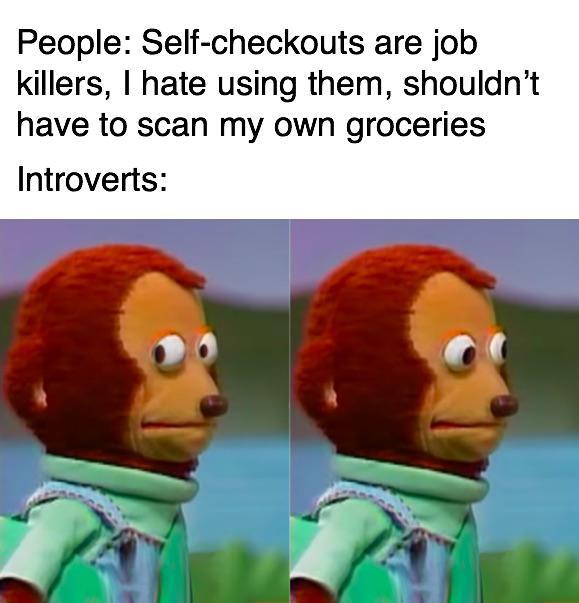this post was submitted on 25 Sep 2023
1454 points (96.4% liked)
memes
17561 readers
2286 users here now
Community rules
1. Be civil
No trolling, bigotry or other insulting / annoying behaviour
2. No politics
This is non-politics community. For political memes please go to !politicalmemes@lemmy.world
3. No recent reposts
Check for reposts when posting a meme, you can only repost after 1 month
4. No bots
No bots without the express approval of the mods or the admins
5. No Spam/Ads/AI Slop
No advertisements or spam. This is an instance rule and the only way to live. We also consider AI slop to be spam in this community and is subject to removal.
A collection of some classic Lemmy memes for your enjoyment
Sister communities
- !tenforward@lemmy.world : Star Trek memes, chat and shitposts
- !lemmyshitpost@lemmy.world : Lemmy Shitposts, anything and everything goes.
- !linuxmemes@lemmy.world : Linux themed memes
- !comicstrips@lemmy.world : for those who love comic stories.
founded 2 years ago
MODERATORS
you are viewing a single comment's thread
view the rest of the comments
view the rest of the comments

I understand what you're saying and I don't necessarily disagree, but you don't seem to understand my point. The idea of automation that you have is based on the sci-fi idea that robots will do all of the work for us and we wouldn't have to work anymore. It's just a thought experiment. This idea isn't reflected in the real world. We've already been through automation revolutions before, and every time, the economy just shifts to something else.
For example, for a very long time, being a lamplighter was a popular job. A bunch of people would get hired to go around the city and make sure that the street lamps are lit and well maintained. However, via the magic of automation, the light bulb was invented. Lamplighters were no longer necessary. There were a lot of lamplighters who were angry at this new technology for stealing their jobs and many protested against, some even tried to ban it, but ultimately the convenience of technology won as it always has and always will. But thanks to this new technology there were new jobs created... like electricians who would look after these lightbulbs for example.
My point is that the current automation wave is not going to kill the economy. It'll just simply shift and make it more complex. There will still be jobs, but they will either be entirely new or they'll be an existing job but simply updated to address society's new needs. There will still be people who will work on creating automation technology, people who maintain it, people who will manufacture it, scientists who will try to research improve it, and so on. There will also be jobs that haven't been created yet. Just 20 years ago, Youtube wasn't even a thing but now being a youtuber is an actual profession held by tens of thousands of people. What's to say we're not going to see something similar in the next 20 years? It's silly to think that we're going to have an economy of picnics and parties any time soon when all we have to support this notion is pop culture speculation. The reality is that the wheels of the economy are just going to keep on turning like they always have.